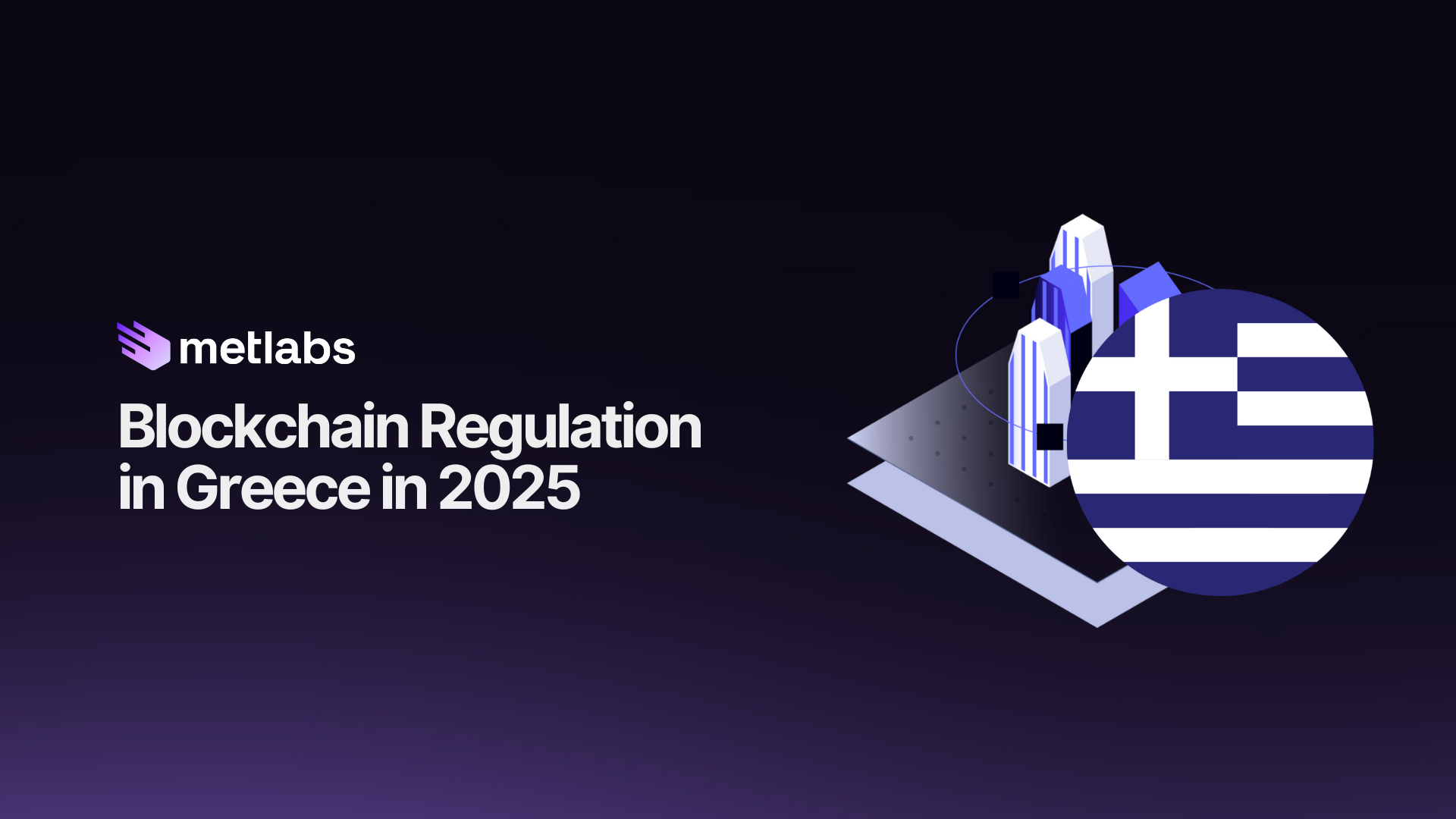The adoption of blockchain technology and asset tokenization is advancing at a rapid pace, but the real engine driving its global development is the existence of a clear, consistent and innovation-friendly legal framework.
Some countries have already established themselves as regulatory benchmarks, establishing specific rules for cryptoassets, DLT infrastructures and token issuance with legal backing. In this article we show you relevant information about blockchain regulation in Greece, which you can use as a guide if you are looking to operate internationally or evaluate different strategic locations.

Current legislation on blockchain and virtual assets in Greece.
MiCA Regulation (Markets in Crypto-Assets Regulation)
Establishes the EU’s first comprehensive legal framework for regulating cryptoasset issuers and service providers (CASPs). Covers stablecoins, utility tokens, electronic money tokens (EMTs), asset referenced tokens (ARTs), and custody or exchange platforms. Requires prior authorization, governance requirements, solvency, transparency, and user protection.
MiFID II (Markets in Financial Instruments Directive II)
Security tokens and derivatives on cryptoassets that fall into the category of financial instruments are regulated in Greece under MiFID II. Platforms offering these products must be duly licensed by HCMC and comply with transparency standards, investor protection and solvency requirements.
Greek law on the prevention of money laundering (Law 4557/2018).
CASPs in Greece are required to comply with the Greek Prevention of Money Laundering Law (Law 4557/2018). In line with AMLD5, KYC controls, continuous monitoring and reporting to FIU Helena by registered companies must be applied.
Cryptoassets Sandbox and DLT Pilot Regime in Greece
Greece participates in the European Blockchain Sandbox and has driven pilot projects in real estate tokenization and EMT/ART stablecoins. The Greek DeFi and Web3 ecosystem shows a growing interest in developing under this flexible regulatory framework. Greece is also a participant in the EU DLT Pilot Scheme.
Tokenization makes it possible to digitally represent real-world assets through blockchain, but for it to have legal value, a regulatory framework recognizing this operation is essential. Greece adopts its own approach, establishing specific rules for the issuance, custody or trading of tokens. In this block we explain how asset tokenization is regulated from a legal point of view, taking an advanced jurisdiction such as Greece as an example.
Regulation of asset tokenization in Greece
Asset tokenization in Greece is integrated into the European legal framework. Tokens representing financial instruments, such as stocks, bonds or fund shares, are regulated under the MiFID II Directive and supervised by the Greek Capital Market Commission (HCMC). These tokens require prior authorization for issuance and trading on regulated markets. Utility tokens and stablecoins EMT (electronic money tokens) or ART (asset-backed tokens) are governed by MiCA regulations.
Greece participates in the European Union’s DLT Pilot Scheme, which enables the operation of market infrastructures in blockchain technology for trading tokenized financial instruments. In addition, HCMC drives innovation in the sector through its collaboration in the European Blockchain Sandbox, promoting stablecoins, tokenization and decentralized finance (DeFi) projects.
As for the tokenization of non-financial assets, such as real estate or art, there is no specific regulation in Greece, but it is recognized by private law. Depending on the nature of the tokens, these projects may be subject to civil, tax or consumer protection regulations. Blockchain-based records (DLT) have full legal validity, providing security for transactions and ownership of tokenized assets.
Regulatory bodies and authorities for digital assets in Greece
Hellenic Capital Market Commission (HCMC)
The HCMC is the main regulatory authority for blockchain and cryptoassets in Greece. It oversees the CASPs authorized under the MiCA Regulation, the issuance of tokens, the operation of exchanges and custodians, and the application of MiFID II for security tokens. He also leads the Greek participation in the DLT Pilot Regime and the European Blockchain Sandbox.
Bank of Greece
The Bank of Greece collaborates in the supervision of stablecoins that may have systemic risk, particularly in terms of reserves and liquidity. It participates in the European digital euro project and assesses the effects of cryptoassets on monetary policy and national financial stability.
Hellenic Financial Intelligence Unit (FIU Helena)
The FIU Helena is the national financial intelligence unit. It monitors AML/CFT compliance by CASPs, administers mandatory registration and receives suspicious transaction reports. It coordinates with HCMC and other authorities to strengthen the integrity of the Greek financial system.
Ministry of Finance of Greece
The Greek Ministry of Finance is responsible for transposing the European directives on the prevention of money laundering (AMLD5 and AMLD6) and collaborates in the design of the regulatory framework for digital assets. It participates in the development of policies for the development of the digital economy, blockchain and fintech in the country.
Launching a business based on digital assets requires more than just technology: it is also necessary to comply with legal requirements such as licensing, registration and regulatory obligations. These conditions ensure that the business model is viable and sustainable over time, and that it meets transparency and fraud prevention standards. In this section we explore what licenses are typically required and what compliance criteria blockchain companies operating in Greece must follow.

What licenses and requirements are needed to trade cryptoassets in Greece?
CASP License (MiCA)
Since the entry into force of MiCA, CASP licensing is mandatory for exchanges, custodians, issuers of stablecoins (EMT or ART) and other cryptoasset service providers operating in the country. The competent authority for MiCA licensing and supervision of CASPs is the Επιτροπή Κεφαλαιαγοράς (Greek Capital Market Commission, HCMC). In the case of stablecoins with systemic impact, HCMC collaborates with the Bank of Greece (Τράπεζα της Ελλλάδος).
License as a Greek Investment Firm (ESI)
When a platform offers in Greece financial derivative products on cryptoassets (e.g. futures, options or CFDs), these products are considered regulated financial instruments under the MiFID II Directive. In these cases, the platform must obtain an Investment Firm license from HCMC in order to operate legally.
AML/KYC Compliance
Cryptoasset companies in Greece must comply with national legislation on the prevention of money laundering and terrorist financing, which implements the transposition of AMLD5. This includes the obligation to perform comprehensive KYC procedures, continuous monitoring of transactions, identification of beneficial owners and reporting of suspicious transactions to FIU Helena. AML/KYC compliance is a prerequisite for operating as a CASP in Greece.
Are you exploring developing your blockchain project in Greece?
At Metlabs we help companies like yours and offer comprehensive accompaniment in the development of blockchain projects and tokenization of assets such as real estate, carbon credits, commodities, intellectual property, financial instruments, franchises and more, fully aligned with blockchain regulation in Greece and international regulatory standards.
Contact us and find out how we can help you meeting all your business model needs, from technical validation and structuring to design, development and implementation of custom blockchain solutions, ready to scale from day one.



